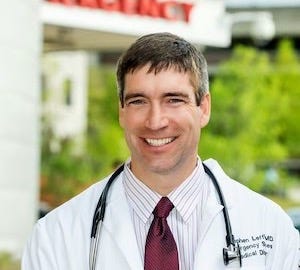UPDATED: Head of UVM Health Network resigns
Hinesburg’s Dr. Stephen Leffler named as interim CEO; a challenge lies ahead.
The Record Staff
University of Vermont Health Network’s president and CEO, Sunil (Sunny) Eappen, resigned Thursday, less than a week after the state health care regulator slammed the network for its high executive compensation and cost of care and ordered a reduction in its budget.
Dr. Stephen Leffler of Hinesburg, president of UVM Medical Center, was appointed to serve as the interim president and CEO — effective Oct. 15, the UVM Network Board of Directors announced in a news release.
Leffler has been president of the medical center since 2020 and before that served as an emergency room physician, chief population health quality officer and chief medical officer at the medical center. Leffler received his medical degree from UVM.
“I want to thank the board and the entire staff of UVM Health Network for having the confidence in me to lead in this pivotal time for health care in our region and across the country,” said Dr. Leffler. “As health care continues to evolve, this transitional period is going to continue to challenge us all, and I am committed to making sure this health system changes to meet the needs of our patients now and into the future.”
UVM Health Network operates six hospitals — three in Vermont and three in New York State. UVM Medical is its flagship.
The UVM Health Board was clear about the reasons for Eappen’s resignation. Tom Golonka, chair of the UVM Health Network board, said Eappen’s departure was intended to demonstrate the network understood the need to change.
“We're serious about affordability, access and quality, and we hear the messages from the community members and the regulators that we need to do better,” Golonka said in the network’s release.
The Green Mountain Care Board (GMCB) recently set annual hospital budgets for the coming fiscal year and took issue with the network’s reallocations of finances from its flagship University of Vermont Medical Center to its less profitable New York affiliates. UVM Health Network had asked for an increase of more than 2 percent, but GMCB ordered a 6.4 percent reduction instead.
The board also turned down the network’s request for a more than 2 percent increase in budget, instead ordering it to cut 6.4 percent or about $90 million.
GMCB also noted that at the end of last year, the network’s 19 top executives made a collective $3 million in bonuses — despite rising costs and budgets shortfalls. At the same time, the network ended kidney transplant surgeries at the University of Vermont Medical Center in Burlington and the inpatient psychiatric unit at Central Vermont Medical Center in Berlin and closed two affiliated clinics in the Mad River Valley.
GMCB chair Owen Foster didn’t hold back at the board’s recent hearing on rates.
“University of Vermont Health Network does not provide health care,” Foster said. “It’s essentially an expensive and ineffective layer of overpriced and unnecessary corporate bureaucracy that has proven itself both physically and spiritually distant and unconnected from the mission of our flagship academic medical center and the needs of Vermonters.”
Under Eappen’s leadership, UVM Medical Center — the network’s largest hospital — has seen costs increase dramatically, as have other hospitals across the state and the country. However, the increases at UVM have far outpaced rates of medical inflation, something GMCB noted in its annual hospital budget setting process. Prices at UVM Medical Center in Burlington, have been a key cost driver behind the state’s nation-leading insurance premiums.
Foster outlined what he called the “corporate shell game” of cash flow from the medical center to the network and the network’s three New York hospitals. That cost shift results in the medical center’s profit margins and cash reserves appearing smaller than they should be, he said.
During the GMBC hearing 10 days ago, Foster was particularly concerned about the service cuts UVM Health Network made last year: He explained that while the network shuttered dialysis programs and clinics in the Mad River Valley, it also moved $10 million from UVM Medical Center to its New York hospitals, according to a report in VTDigger.
Under Eappen’s management, Vermont’s hospitals have seen “unrelenting expense growth far exceeding inflationary metrics,” Foster said, while the quality of care has deteriorated and the gap between executive compensation and the network’s lowest-paid workers has widened.
Foster cited “excessive charges” for life-saving medications and medical imaging, and a waitlist of more than 3,000 patients for a colonoscopy, all while the network invests in its lobbying and external-relations arm. He worried about the impact of losing services like birthing centers or primary care clinics all across the state while individuals, families and insurers all struggle to keep up with the high cost of health care.
Eappen began at the UVM Health Network in November 2022, after working as a hospital administrator for 14 years at Brigham & Women’s Hospital in Boston. He will stay on until December to assist in the transition.
The Record drew some information from reports by VTDigger, Seven Days and Vermont Public.


